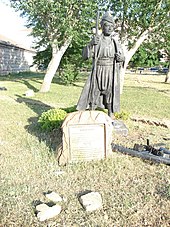Yunus Emre
Yunus Emre (* around 1240 , † around 1321 ) was a Turkish poet and mystic ( Sufi ) of the Bektaschi-Tariqa .
He is considered one of the first mystical folk poets of the Ottoman-Turkish language tradition and, because of his language, which is rooted in the people, but also because of his modest way of life in Turkey, as a pioneering poet. His works are required reading in the Turkish educational system from the upper level.
Life and work
From the 13th century onwards, mystics wrote verses in the Turkish language . With the name Yunus Emre the tradition of the singable, simple mystical song is associated. From then on, this tradition is typical for the literature of the Sufi orders, for example the Bektashi dervishes . The Bektaschis make use of the traditions of this song, which existed before the 9th century, the "nefes" (breath). Yunus Emre also used this style of singing, which Alevis call Deyiş (spoken) or Deme (spoken).
Yunus Emre shaped Anatolian humanism with his numerous poems and songs. All of Yunus Emre's works have come down to us as İlâhi collections (hymn books).
According to the Anatolian Alevis , Yunus Emre has significantly influenced and manifested Alevism. They refer to all of Yunus Emre's poems that praise Ali ibn Abi Talib . There is an extraordinarily large number of poems which, from the point of view of the Alevis, can be classified as Alevi poems.
The central theme of his poems is Sufi philosophy, which goes back to Neoplatonism . After he - as he states in his poems - "40 years" in the service of a mystic named Taptuk Emre , he is released from his service and henceforth leads the life of a dervish.
Because of his poetry, the Alevis count him among their holy poets, even if he is not officially included. Officially in Turkey he is considered an advanced student (dervish) of Sufism, especially of the Bektashi order. In the Yunus Emre-Mosque in Karaman , the grave Yunus Emre should be.
Yunus Emre was, like many dervishes of his time, a student of Hacı Bektaş Veli , who was an anti-Orthodox mystic and possibly belonged to the Sufi sect of the Qalandar . As a wandering dervish, Yunus Emre carried the teachings of Hacı Bektaş Veli to villages and towns and recorded them in his countless poems.

Poem (selection)
dolap niçin inilersin
derdim vardır inilerim
ben mevlâya âşık oldum
anın için inilerim
benim adım dertli dolap
suyum akar yalap yalap
böyle emreylemiş çalap
derdim vardır inilerim
beni bir dağda buldular
kolum kanadım yoldular
dolaba lâyık gördüler
derdim vardır inilerim
ben bir dağın ağacıyım
ne tatlıyım ne acıyım
ben mevlâya duacıyım
derdim vardır inilerim
dağdan kestiler hezenim
bozuldu Türlü düzenim
ben bir usanmaz ozanım
derdim vardır inilerim
dülgerler hep beni yondu
her âzam yerine kondu
bu iniltim haktan geldi
derdim vardır inilerim
suyum alçaktan çekerim
dönüp yükseğe dökerim
görün ben neler çekerim
derdim vardır inilerim
YUNUS burda gelen gülmez
kişi muradına ermez
bu thinyada kimse kalmaz
derdim vardır inilerim
why are you sighing / waterwheel?
because i suffer i have to sigh /
have started to love god /
therefore i have to sigh
and my name is wheel of pain /
my waters run down /
because this is what god has commanded /
because I suffer I have to sigh
they found me in the mountains /
tore twigs and wings /
turned me into a waterwheel /
because i suffer i have to sigh
I'm from the wood of the mountain tree
am not sweet and am not bitter /
am a prayer only to god /
because I suffer I have to sigh
oh / they pruned my branches /
how was the shape changed /
i
am a tireless singer /
because i suffer i have to sigh
carpenters cut to size /
all parts fitted /
god created this sigh for me /
because I suffer I have to sigh
downstairs I shovel the water /
turn it up /
everything I wear / looks /
because I suffer I have to sigh
YUNUS came / he can't laugh /
nobody went the way to the end /
nobody stays in this world /
because I suffer I have to sigh
Appreciations
- The UNESCO declared the year 1990 to Yunus Emre-Year (Year of Peace and Love).
- Yunus Emre mosques are a reminder of Yunus Emre.
- The Turkish composer Ahmed Adnan Saygun wrote an oratorio in which 13 religious poems by Emre are treated.
- In the Türkenschanzpark Vienna there is a fountain in honor of Yunus Emre. The fountain is decorated with writings by the mystic.
- Yunus Emre is shown on the back of the 200 TL banknotes valid from January 1, 2009 .
- The Turkish broadcaster TRT produced a series about Yunus Emre with 45 episodes from 2015 to 2016.
literature
- Gisela Kraft : Yunus Emre, Pir Sultan Abdal . Mit Bergen mit Steinen - Nachdichtung und Randtexte , Harran Verlag, Berlin 1981. ISBN 3-922578-04-7
- Annemarie Schimmel : Hikes with Yunus Emre. Önel, Cologne 1989
- Annemarie Schimmel: Yunus Emre. In: Numen, Vol. 8, Fasc. January 1 , 1961, pp. 12-33
- Literature by and about Yunus Emre in the catalog of the German National Library
Web links
Individual evidence
- ↑ Turkey City Guide: Karaman
- ↑ Cf. Sura 9:82: "Just laugh a little and weep a lot / For what you have done!" (Translation: Friedrich Rückert, 1788–1866).
- ↑ Translation / retouching in the original spelling of the author Gisela Kraft, from: Mit Bergen mit Steinen , p. 6 f. (see section Literature ).
| personal data | |
|---|---|
| SURNAME | Emre, Yunus |
| BRIEF DESCRIPTION | Turkish poet, mystic, Sufi |
| DATE OF BIRTH | 13th Century |
| DATE OF DEATH | around 1321 |

